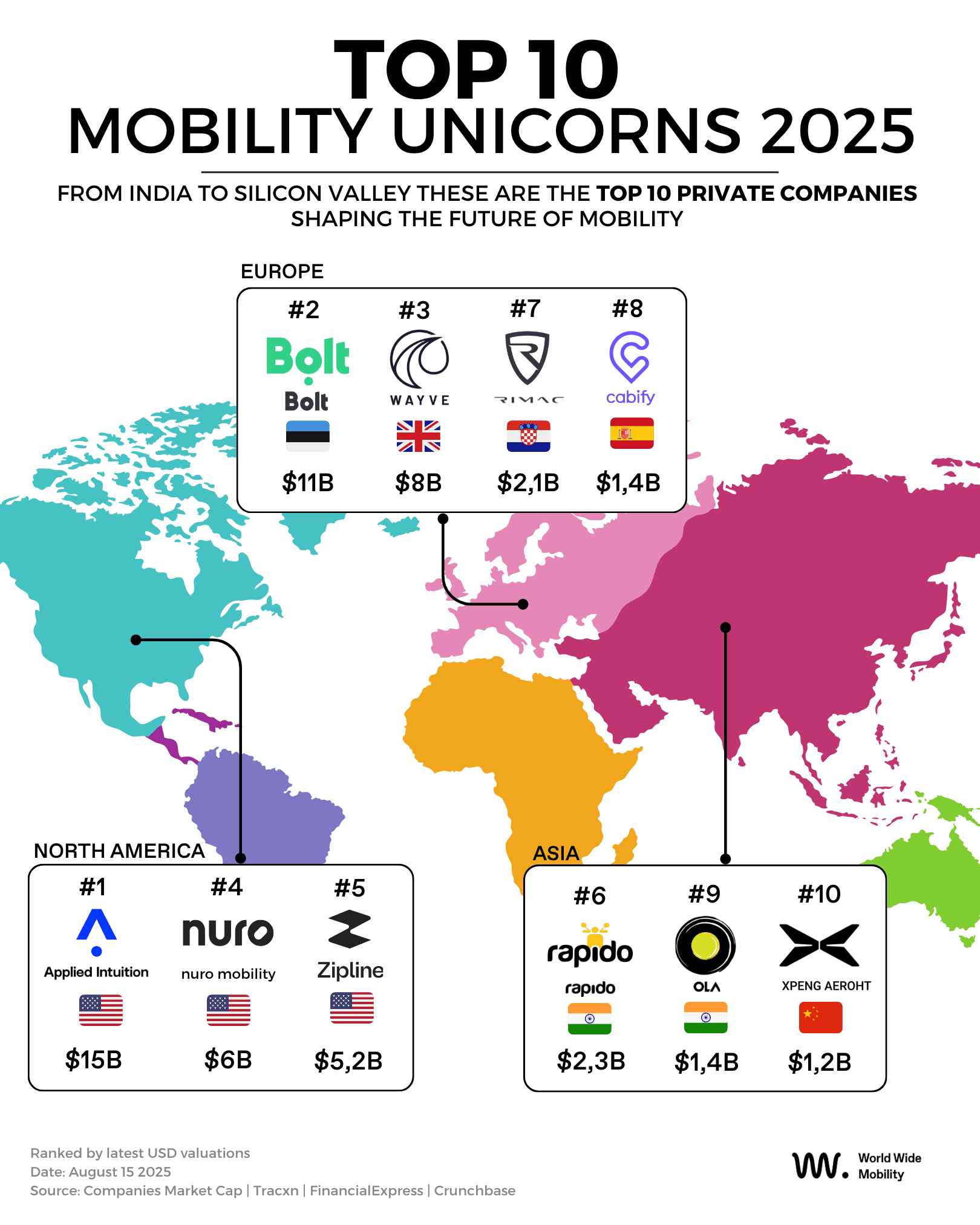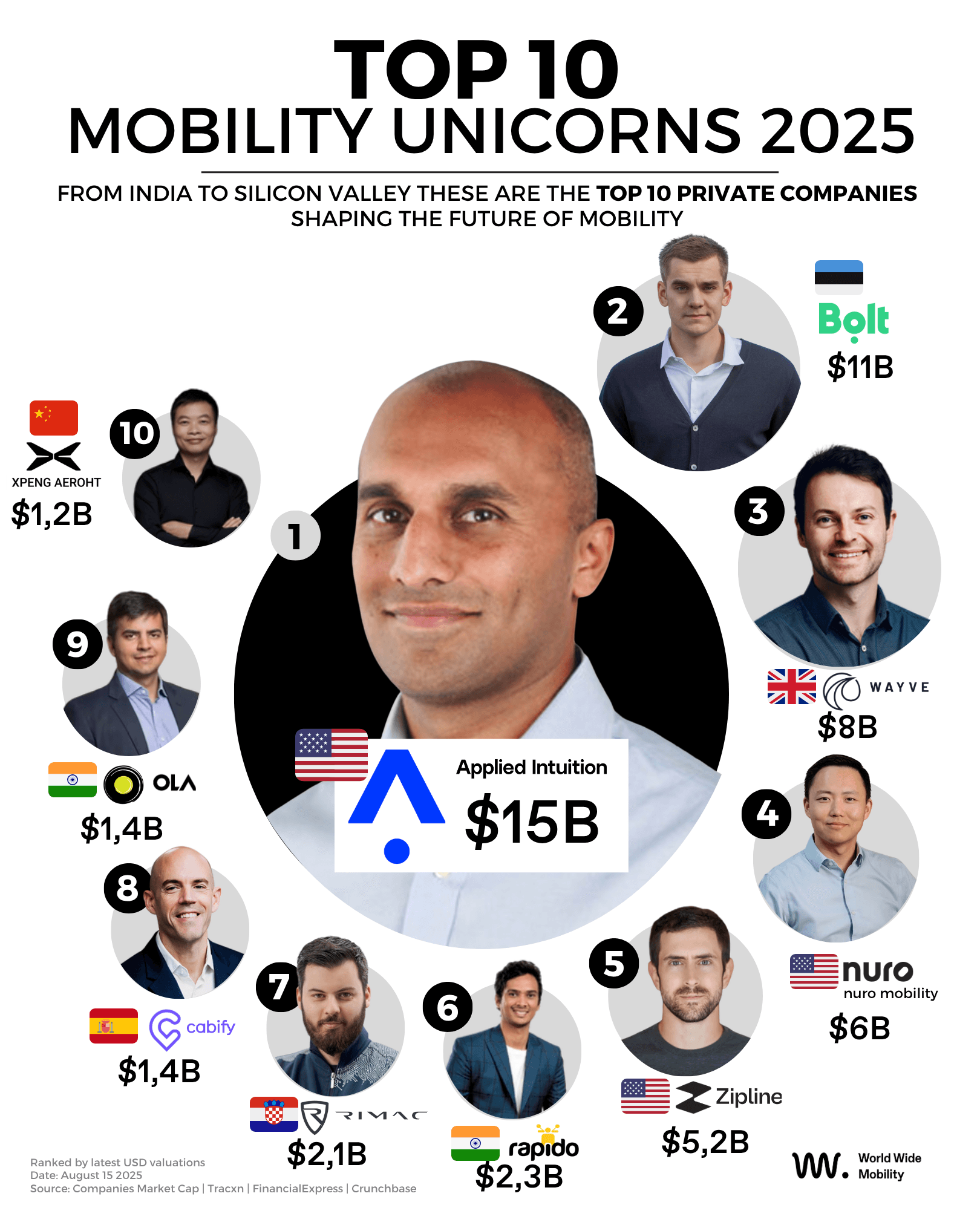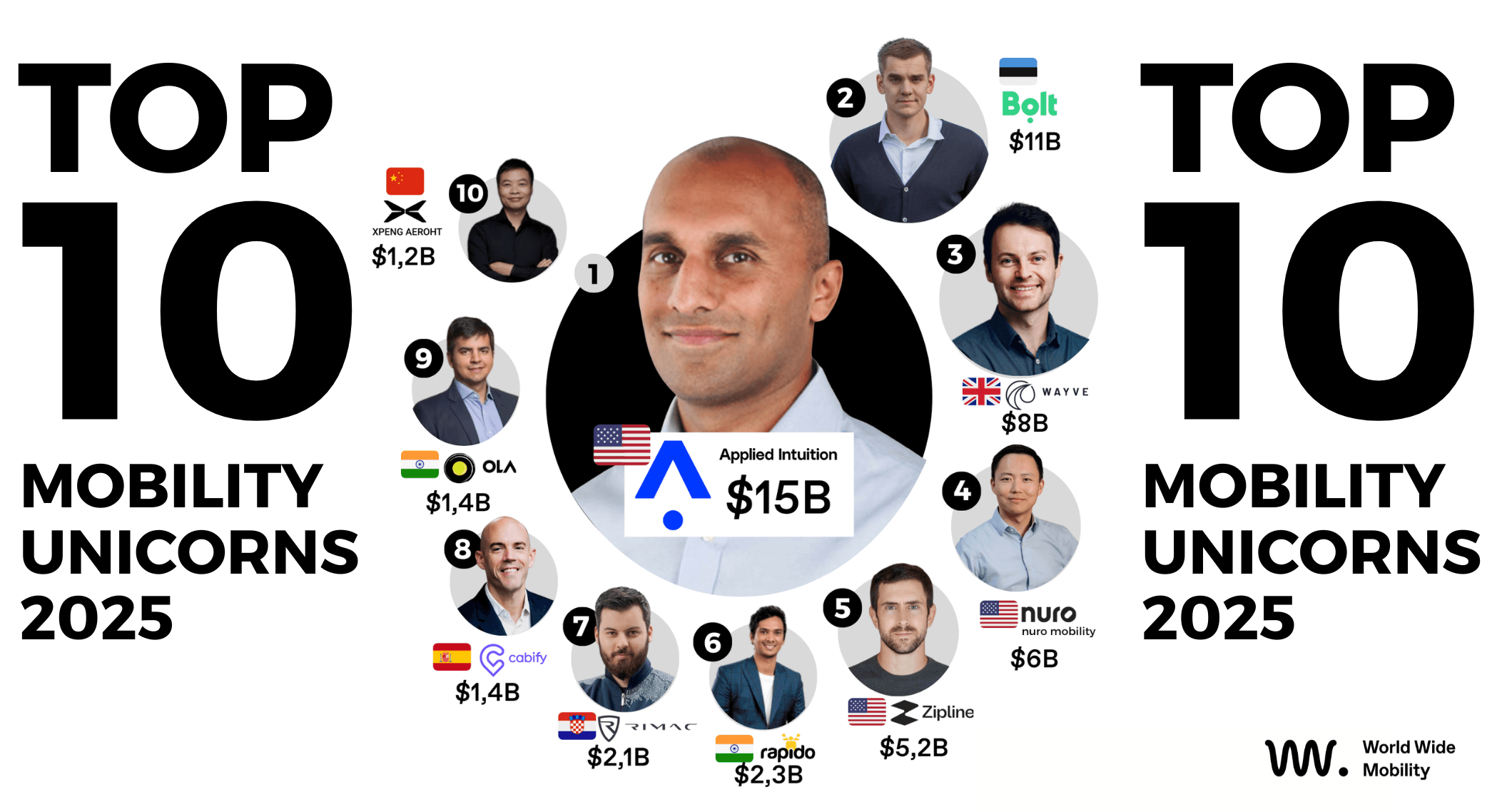At World Wide Mobility, we tracked global valuations and company growth to reveal the top 10 Mobility Unicorns of 2025, the private startups worth over $1 billion that are reshaping how the world connects, travels, and transports.
These are not just startups, they’re innovators shaping the global mobility ecosystem.

Where the Next Mobility Giants Are Emerging
North America
The U.S. remains the epicentre of autonomous innovation. With Applied Intuition, Nuro, and Zipline, North America continues to dominate the intersection of AI, logistics, and automation worth more than $26 billion combined.
Europe
Europe’s edge lies in its diversity of approaches. Bolt, Wayve, and Rimac prove that innovation can thrive in regulation-heavy markets, blending sustainability, speed, and cutting-edge engineering.
Asia
Asia is the world’s growth engine for affordable and scalable mobility, in adittion to . Rapido and Ola are redefining urban transport for millions, while XPENG AeroHT points to a near-future where vehicles take flight.
| Rank | Company | Headquarters | Valuation (USD) | Description |
|---|---|---|---|---|
| 1️ | Applied Intuition | 🇺🇸 California, USA | $15 B | The “engineer’s secret weapon” for autonomous systems, its simulation software is used by the world’s leading automakers to safely test and train self-driving vehicles. |
| 2️ | Bolt | 🇪🇪 Tallinn, Estonia | $11 B | Europe’s all-in-one mobility app offering varied services including rides, scooters and food delivery, expanding rapidly across more than 45 countries. |
| 3️ | Wayve | 🇬🇧 London, United Kingdom | $8 B | Developing deep-learning autonomy that teaches cars to drive anywhere they are programmed to using AI rather. They are backed by Microsoft and SoftBank. |
| 4️ | Nuro | 🇺🇸 Mountain View, USA | $6 B | Builds small, driverless electric pods for last-mile delivery. Partners include Kroger and Walmart — proving autonomy works for everyday logistics. |
| 5️ | Zipline | 🇺🇸 San Francisco, USA | $5.2 B | Operates autonomous electric drones delivering medical supplies and e-commerce parcels across Africa, the U.S., and Asia using a sustainable, fast, and precise method to complete their objectives. |
| 6️ | Rapido | 🇮🇳 Bengaluru, India | $2.3 B | India’s largest two-wheeler network, turning ordinary motorbikes into efficient, low-cost urban taxis and delivery vehicles. |
| 7️ | Rimac | 🇭🇷 Sveta Nedelja, Croatia | $2.1 B | Europe’s EV hypercar star. Supplies high-performance electric powertrains to well known brand in the industry including Porsche and Bugatti, while building record-breaking cars of its own. |
| 8️ | Cabify | 🇪🇸 Madrid, Spain | $1.4 B | A leader in ethical ride-hailing, Cabify is invested in carbon-neutral mobility, and fair conditions for every driver on the road, now expanding through Latin America. |
| 9️ | Ola | 🇮🇳 Bengaluru, India | $1.4 B | More than a ride-hailing platform — Ola is building India’s electric mobility ecosystem with scooters, batteries, and nationwide charging networks. |
| 10 | XPENG AeroHT | 🇨🇳 Guangzhou, China | $1.2 B | The flying-car division of XPENG Motors. Developing high quality eVTOLs that merge automotive design with vertical take-off technology. |

The Faces Behind the Unicorns
These are the leaders behind every billion-dollar mobility company who dared to redefine how we move, turning ideas into global revolutions that now shape cities, industries, and lives.
1. Qasar Younis — Applied Intuition
A former Google engineer and Y Combinator alumnus, Qasar Younis co-founded Applied Intuition to make autonomy development faster and safer.
He believes the key to unlocking self-driving technology lies in the power of simulation and under his leadership, the company has become a vital partner for automakers worldwide.
2. Markus Villig — Bolt
At just 19, Markus Villig started Bolt from his hometown of Tallinn with little more than a laptop. Today, he leads one of Europe’s largest mobility platforms, built on a mission to make transport smarter, greener, and more affordable.
Villig’s story reflects the new European startup ethos, lean, driven, and globally ambitious.
3. Alex Kendall — Wayve
Alex Kendall is part of a new generation of founders merging AI research with real-world involvment.
After completing his PhD in machine learning, he co-founded Wayve to create self-driving cars that learn to drive anywhere, without pre-programmed maps or routes.
His approach is redefining what “intelligence on wheels” really means, as he calls it.
4. Dave Ferguson — Nuro
Dave Ferguson, once a lead engineer at Google’s self-driving project, started his own successful project, in the delivery of goods, not people.
As co-founder and CEO of Nuro, he’s leading the charge in autonomous delivery vehicles that make daily life easier, safer, and more sustainable.
Ferguson’s philosophy is simple: real innovation solves human problems.
5. Keller Rinaudo Cliffton — Zipline
Keller Rinaudo Cliffton founded Zipline with a vision that blended robotics, logistics, and humanitarian impact.
What began as a mission to deliver vaccines by drone in Rwanda has grown into a global operation serving healthcare and retail sectors.
His leadership proves that technology can be both profitable and profoundly purposeful.
6. Aravind Sanka — Rapido
Aravind Sanka saw opportunity in India’s most common form of transport the motorbike. As co-founder of Rapido, he turned that insight into a mobility network that moves millions daily, efficiently and affordably.
Sanka represents a generation of Indian entrepreneurs focused on scale, inclusion, and local relevance.
7. Mate Rimac — Rimac Automobili
Often compared to Elon Musk, Mate Rimac built his first electric car at 21 in a small Croatian garage.
His relentless engineering passion turned Rimac Automobili into one of Europe’s most respected EV innovators, now powering powerful companies, such as, Bugatti and Porsche.
Rimac’s story is one of persistence proof that world-class innovation can come from anywhere.
8. Juan de Antonio — Cabify
Juan de Antonio founded Cabify in 2011 with a clear mission: create a responsible, sustainable alternative to global ride-hailing giants.
A former telecom engineer, he built the company around fairness fair pay for drivers, transparent regulation, and net-zero emissions goals.
9. Bhavish Aggarwal — Ola
Bhavish Aggarwal through Ola, he has built not just a ride-hailing platform, but an entire electric mobility ecosystem spanning vehicles, batteries, and charging infrastructure.
Aggarwal’s ambition is bold: to make India the world’s largest hub for affordable, clean mobility.
10. Zhao Deli — XPENG AeroHT
Engineer and entrepreneur Zhao Deli has spent years pursuing a dream that once belonged to science fiction: personal flying cars.
As the founder of this company, he now is turning fiction to reality, as he leads the team behind the world’s first road-legal eVTOL.
His work captures China’s blend of technical ambition and manufacturing mastery pushing mobility to new heights.
